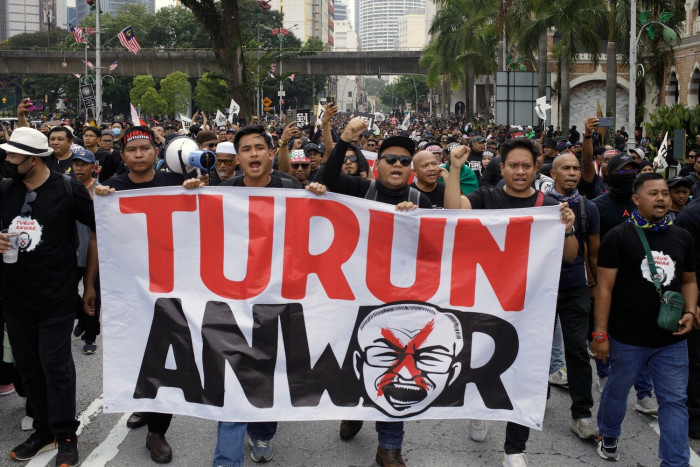Protests Erupt in Kuala Lumpur Amid Rising Cost of Living
Published: 26 Jul 2025 | Updated: 26 Jul 2025
Mass Mobilization Against Prime Minister Anwar Ibrahim
On Saturday, Kuala Lumpur witnessed a significant protest as approximately 20,000 Malaysians rallied in a show of discontent towards Prime Minister Anwar Ibrahim. Demonstrators, led by opposition parties, gathered despite adverse weather conditions, marking the first major rally against Anwar since his ascension to power in 2022.
Concerns Over Governance and Accountability
Former Prime Minister Mahathir Mohamad, who recently celebrated his 100th birthday, joined the protest. He accused Anwar of weaponizing the legal system against political opponents, dismissing the claims of innocence from the current administration. Mahathir’s vocal criticism reflects long-standing political rivalries that have shaped Malaysian governance for decades.
Historical Context of Political Feuds
The relationship between Mahathir and Anwar is fraught with tension, having shifted from allies to adversaries over the years. Following a coalition that ended the Barisan Nasional’s long-standing rule, their partnership deteriorated due to internal conflicts, heralding a new era of political uncertainty in Malaysia.
Police Response and Public Sentiment
In response to the protests, law enforcement planned strategic traffic diversions, aiming to facilitate the demonstration while maintaining order. Prime Minister Anwar appeared unfazed by the protests, minimizing their significance, and emphasized that he “was not invited” to the event.
Economic Grievances Take Center Stage
The rising cost of living has become a dominant theme among the protesters, with chants of “Turun Anwar” echoing through Kuala Lumpur’s independence square. Anwar faces harsh criticism for his government’s handling of economic issues, including inflation and unmet reform promises, which have sparked discontent among citizens.
Judicial Independence and Political Challenges
Recently, lawyers marched in Putrajaya advocating for judicial independence, indicating a growing desire for systemic reforms. However, the Malaysian Bar’s attempt to hold Anwar accountable was thwarted due to a lack of quorum at a crucial meeting. This disappointment further illustrates the persistent political challenges facing the administration.
Future of Anwar’s Government Amid Scrutiny
With a supermajority in Parliament, Anwar’s government leads a coalition of diverse political ideologies, yet the pressures for accountability remain high. Prominent non-governmental organizations distance themselves from calls for a mid-term change, highlighting the reticence regarding political overhaul in a climate fraught with instability.
No Malaysian Prime Minister has completed a full term since 2018, and with Anwar reaching the halfway mark of his tenure, he currently stands as the longest-serving prime minister in seven years. As the nation navigates economic and political turbulence, the calls for change may intensify as the next general election approaches.
